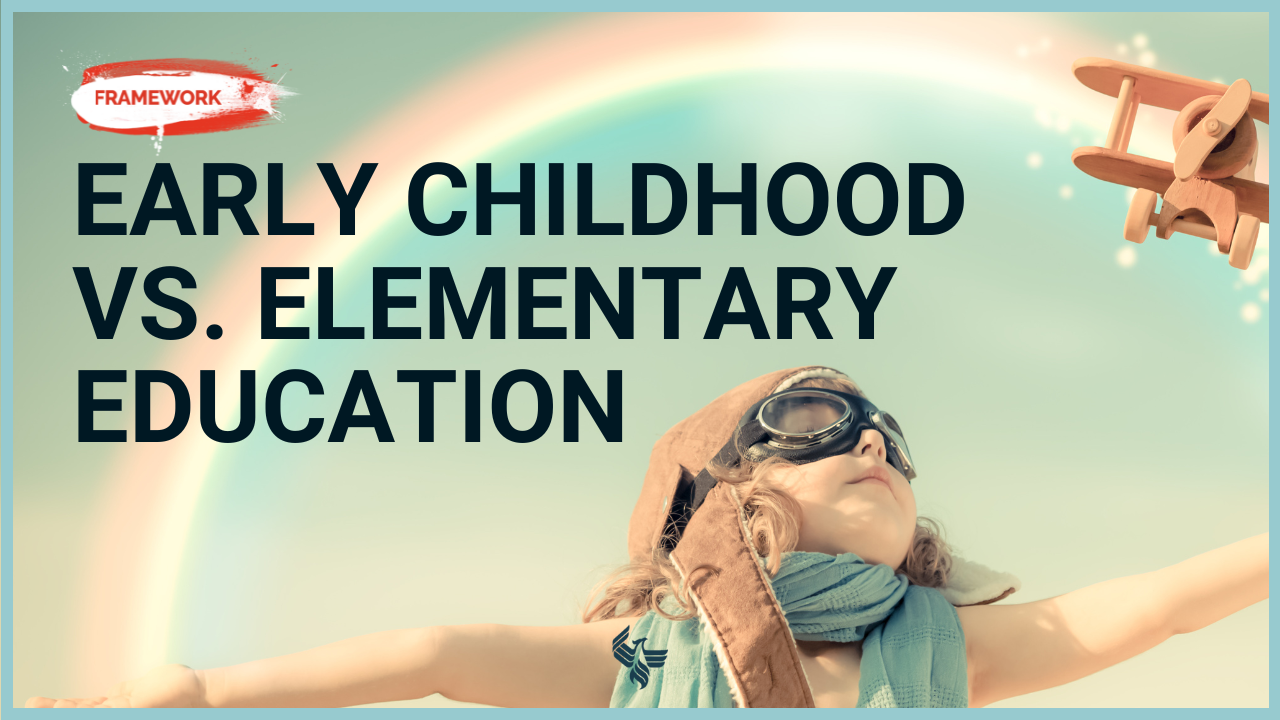Early childhood education vs. elementary education

Written by Michael Feder

Reviewed by Pamela M. Roggeman, EdD, Dean, College of Education

When deciding whether to pursue a degree in early childhood education or elementary education, knowing what’s the best fit can be difficult. That’s why it’s important to understand the key differences between these two educational pathways. Here is a look at each, their similarities and differences.
Similarities and differences in early childhood and elementary education
One primary difference between early childhood and elementary education is the age of students. Early childhood education encompasses teaching children up to 8 years old. Elementary education typically starts at first grade and can go through eighth grade.
While teacher education programs for elementary education generally have more rigorous requirements than early childhood programs, both require schooling and hands-on training before certification can be granted.
Early childhood education
Early childhood education is a field dedicated to helping children develop skills to succeed in their academic and social lives. A common goal of early childhood education is to help children develop self-esteem and social and cognitive skills.
This type of position involves learning more about how young children learn and develop.
A typical day for an early childhood educator might involve helping young children learn how to play nicely with others, express their feelings through art projects or understand the importance of small responsibilities, such as cleaning up after playtime. Children often learn various skills through playtime, such as cognitive, communication and social skills.
Necessary skills for early childhood education
The ideal early childhood educator is someone who enjoys working with children and has patience and empathy. Since early childhood educators often work with multiple staff members, they should also be comfortable with teamwork.
Early childhood educators’ duties include helping kids prepare for elementary school by introducing them to reading, math and other creative activities. Educators in this field may also facilitate activities that promote physical fitness such as running laps around the playground or playing games like tag with other kids.
Salary expectations for early childhood education
As of May 2023, early childhood educators earned a salary range between $28,200 and $60,900 annually, with a median wage of $37,130, according to the U.S. Bureau of Labor Statistics (BLS). Preschool and early childhood educators often work outside of publicly funded school systems — sometimes through nonprofit or religious institutions with limited funding and other times as privately funded entities. One of the benefits of this role is the flexibility in qualifications, which reduces the barrier to entry of employment. Unfortunately, this could lead credentialed or experienced early educators to often be undervalued
Salary ranges are not specific to students or graduates of University of Phoenix. Actual outcomes vary based on multiple factors, including prior work experience, geographic location and other factors specific to the individual. University of Phoenix does not guarantee employment, salary level or career advancement. BLS data is geographically based. Information for a specific state/city can be researched on the BLS website.
Job outlook for early childhood education
The job outlook for early childhood educators is projected to grow by 3% between 2022 and 2032, according to BLS. With national staffing shortages in education, this projection reflects an above-average growth rate compared to the average of all occupations.
BLS Occupational Employment Projections, 2022-2032 is published by the U.S. Bureau of Labor Statistics. This data reflects BLS’ projections of national (not local) conditions. These data points are not specific to University of Phoenix students or graduates.
Elementary education
Elementary education encompasses training students in literacy and math, among other subjects. This is accomplished through methods including direct instruction, collaboration with other teachers and parents, and encouraging students to work independently. Elementary school teachers usually work with children in first grade through eighth grade.
Necessay skills for elementary ed
To be successful in an elementary education role requires a variety of skills. Effective communication is perhaps the most important skill that any teacher must have. Teachers must communicate with their students, parents and other teachers to effectively manage classroom behavior and instruction.
Patience is also a necessary skill for teachers. Teaching can be difficult at times, especially when dealing with children who are still developing their social skills. It takes a great deal of patience to be able to effectively teach many students at once.
Teachers also need to be organized and efficient to keep up with the different daily expectations. This might include creating lesson plans ahead of time so they can spend school hours teaching, or it may involve research to determine future subjects and instructional methods.
Salary expectations for elementary ed
As of May 2023, elementary school teachers earned between $46,960 and $104,440, with a median wage of $63,680, according to BLS. This salary range does not include special education or substitute teachers. This range is higher than that of early education, and there’s potential for additional increase if a teacher holds a master’s degree. Staffing shortages have prompted many districts to increase wages to incentivize teachers to return to work and bring in new employees.
Job outlook for elementary ed
The overall employment rate for elementary educators is projected to show little or no change from 2022 to 2032.
Choosing between early childhood vs. elementary education
Both early childhood education and elementary education are important paths to consider for those interested in working with children. There are certain factors to consider in choosing between the two.
The first is whether to work with younger or older children. Early childhood educators work with children up to 8-year-olds, while elementary school teachers typically work with kindergartners through eighth grade. Elementary school teachers also have more flexibility in terms of subject matter than early childhood educators, who focus on developmental learning and socialization.
Another factor to consider is what type of environment to work in. Early childhood educators typically work in daycares or preschools, while elementary school teachers work in school classrooms. Both positions involve working closely with families, but the types of relationships vary depending on the age group and where children are being taught.
Finally, it’s important to consider other careers beyond early childhood education and elementary education — secondary education, as well as special education, are fulfilling options for teachers interested in educating older students.
For either career choice, there may be opportunities within the education field after pursuing a master’s degree in education. These could even include roles as a principal, administrator, curriculum director or instructional designer.
Explore early childhood education and elementray education degree programs
Whether you are taking the first step in your journey toward a career in education or looking to expand your existing knowledge and skill set, University of Phoenix offers a variety of degree and certificate options. These include:
- Online bachelor's in early childhood education
- Online bachelor's in elementary education
- Graduate Initial Teacher Certificate/Elementary
- Graduate Initial Teacher Certificate/Secondary
Contact University of Phoenix for more information.
Watch Early Childhood vs Elementary Teacher: Which Is Right for You?

ABOUT THE AUTHOR
A graduate of Johns Hopkins University and its Writing Seminars program and winner of the Stephen A. Dixon Literary Prize, Michael Feder brings an eye for detail and a passion for research to every article he writes. His academic and professional background includes experience in marketing, content development, script writing and SEO. Today, he works as a multimedia specialist at University of Phoenix where he covers a variety of topics ranging from healthcare to IT.

ABOUT THE REVIEWER
As dean of the University of Phoenix College of Education, Pamela Roggeman has spent over a decade in higher education teacher preparation in both the public and private sector. Her experience has included national partnerships that help to advance thought leadership in the field of education. Dr. Roggeman also serves as the President of the Arizona Educational Foundation’s Board of Directors.
This article has been vetted by University of Phoenix's editorial advisory committee.
Read more about our editorial process.



